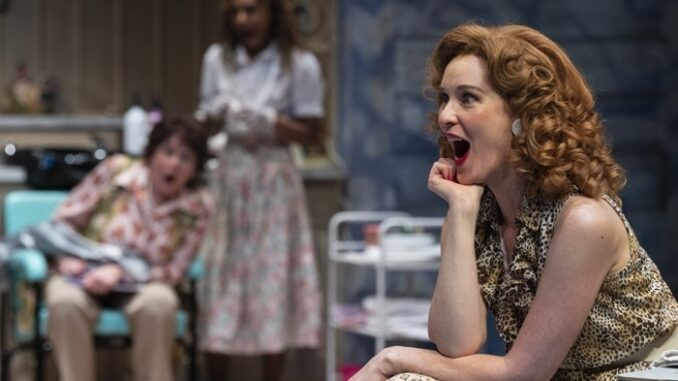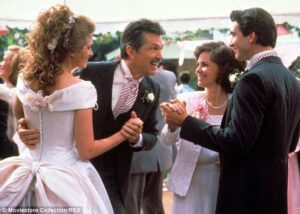
Steel Magnolias captures the value and vivacity of female friendships
Truvy Jones runs a beauty salon in the homey enclosed carport of her house, where her neighborhood regulars gather every Saturday morning to gossip, share life’s triumphs and tragedies, and get their hair done. Animated by Truvy’s conviction that “there’s no such thing as natural beauty,” her salon buzzes with energy in Steel Magnolias, a slice-of-life play offering seasonal snapshots of a small group of women in 1980s Louisiana, playing through April 9 at the Pittsburgh Public Theater.

A character-driven dramedy, the show revolves around a group of female friends navigating love and loss in the fictional Chinquapin Parish, and is propelled by their banter – snappy one-liners more or less evenly distributed among the characters. Director Marya Sea Kaminski, who also serves as PPT’s artistic director, brings this deeply-felt play to the O’Reilly Theater stage with dignity and compassion, and without the disdain for small-town life often heaped upon such people and places.Truvy, played by the statuesque, effervescent Robyne Parrish, can “spot a bottle job at 20 paces,” but chooses to use her keen eye and sharp wit to build up the women around her rather than tear them down. Annelle (Saige Smith) turns up looking for a job at the salon, unsure whether or not she’s married, and Truvy welcomes her into the fold. Nervous but earnest, Smith’s portrayal allows Annelle to cut through the surrounding characters’ polished demeanors to make room for the reality of life’s mistakes and misadventures.There’s also the hilariously aggrieved Ouiser (“Don’t try to get on my good side. I no longer have one.”), played with verve by Helena Ruoti and Clairee (Elizabeth Elias Huffman), widow of the former parish mayor. Clairee, proclaiming “If you don’t have anything nice to say, come sit by me,” weighs what is left to live for following her husband’s death.The emotional center of the play is the relationship between matriarch M’Lynn (“If you’re trying to drive me crazy, you’re too late.”) and her daughter Shelby, plumbing the depths of what it means to unconditionally support your children and how to weather unfathomable loss. As M’Lynn, Monica Wyche offers an understated but touching performance.

The play begins on Shelby’s wedding day. Shelby (Kyra Kennedy) arrives for her bridal ‘do and lays out her plans for a tone-on-tone pink wedding with her colors “blush” and “bashful.” Beautiful, kind, and attuned to others, Shelby’s diabetic attack in the first scene foreshadows medical problems that go on to haunt the rest of the play. The sweetness of Kennedy’s performance ironically sharpens her delivery of Shelby’s biting sarcasm, setting up some of the play’s biggest laughs.Steel Magnolias captures the value and vivacity of female friendships
Photo: Michael Henninger
Steel Magnolias at Pittsburgh Public Theater.
As time goes on, with months elapsing between scenes, M’Lynn struggles with her lack of control over Shelby’s choices, as Shelby decides to have a baby against her doctors’ advice. Annelle gradually transforms into a born-again Christian (Of this, Truvy says, “She left that Friday a pleasant, well-adjusted young lady and returned that next Tuesday a Christian.”). Clairee reinvents herself as the owner of the town radio station, and Ouiser reconnects with an old flame. Truvy holds space for them all, with her generous policy that no one cries alone in her presence.
Vibrant performances from the ensemble cast are accentuated by gorgeous, jewel-toned costumes by Suzanne Chesney,and framed by set designer Anne Mundell’s asymmetric rendering of Truvy’s salon, lit by designer Kathy A. Perkins. Hair and wig design by Sherry Deberson and Tenel Dorsey skillfully enables Annelle and Truvy to actually appear to be transforming their friends’ appearances onstage rather than simply miming their styling.Created by playwright Robert Harling who based the play on his family’s experiences with his diabetic sister, the characters inhabit a women’s world where the men are all husbands and sons, the sons are vaguely disappointing, and the husbands are either bumbling and inattentive or beloved but dead. Despite this, little appears to be missing from their lives as they surround each other with love and support, turning the salon into a refuge from the ever-changing world.
